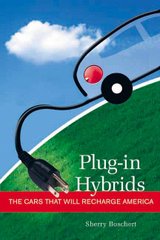Carmakers are desirous of delaying the inevitable but problematic move to electric drive. Oil companies shut out of electric markets are exploring biofuels and hydrogen as potential markets they could control. Academics awash in government and corporate grants analyse and research biofuels and hydrogen. The problem with electric is it is here now. Proven, ready to market. No significant need for research. Batteries could always use a nudge, but the 100+ mile battery has existed for over a decade. Price needs to come down by a factor of one or two, not a factor of 100. Economies of scale, baby!
Facts are facts. Not five years ago we had thousands (about 6000) of battery electrics as daily drivers for consumers like you and me and utilities' fleets like PG&E and SCE. Thanks to Plug In America's predecessor DontCrush.com, about 1000 of those cars still drive today on the original batteries using existing electric infrastructure. Their owners love them, and when one appears on the used car market it sells for more than the $42,000 original MSRP.
Also today, instead of thousands more electric cars envisioned by the original ZEV mandate, we have about 200 one million-dollar hydrogen FCVs functioning as demo vehicles, limited by the lack of infrastructure, and lasting the limited 2 to 4 year life of their fuel cell stack.
The IEEE article does a decent job of wending through the ZEV morass. Auto makers still want lots of credit for fuel cells, they just don't want to keep to the agreed timetable. That which they don't kill (EVs in 2003) they hope to delay (FCVs in 2008).
However plug-in cars, both plug-in hybrids and electric cars are seeing a resurgence. Every car maker has announced intentions to plug something in. But they certainly don't want a mandate to do it. Groups such as Plug In America are asking for parity for Zero Emission Vehicles of whatever type. They say the point is ZEV miles on the road. ARB Board member and recipient of millions in fuel cell and hydrogen grants Dan Sperling fears parity will lead auto makers to take the cheaper "easy way," battery electric cars. "Automakers might abandon their fuel-cell programs," he said.
"So what" reply proponents of battery electric cars, citing battery improvements that surpass fuel cell advancements and existing infrastructure supplying domestically produced fuel at a fraction of the cost of gasoline. A ZEV is a ZEV is a ZEV, they point out, and even Toyota admits we won't see FCVs in the showroom until 2030 at the earliest. ARB is meant to put ZEVs on the road, driving, meeting real people's real needs. Only battery cars can do that near term. CARB could nudge that process along as the ZEV program is revised early in 2008. The IEEE article contains a germ of hope:
...thanks to today's climate - economic, political and atmospheric - some consumers are ready to trade range for a car that costs less to run and produces less pollution. CARB Chairwoman Mary Nichols agrees."People are willing to take a chance..."



4 comments:
I am working on a project for 12 years of a concept BEV with so many novel features, could reach highway speeds even running on lead-acid batteries and could retail under $12K
Please click on www.ev-motion.com then "homepage" and Pac-Man-EV
Roberto
info@ev-motion.com
It seem pretty clear battery electric is hear and ready. Fuel cells are just energy storage devices for hybrogen and 96% of H2 is made from fossil fuel sources.
Maybe in the future when we have green hydrogen from solar and wind it could play a part. Oil is now close to $100 so we can't wait for fuel cells in 10 years.
A simple fact is that fuel cells actually produce electricity to run an electric drive train. Let's be real and use efficient AC electrics with advanced batteries like NiMH and Lithium.
I live in the UK where two companies (Modec Ltd -- see http://www.modec.co.uk ) and Smith EV ( http://www.smithelectricvehicles.com ) have already sold several hundred electric vehicles. Not jokey little cars that can easily be dismissed as cute impractical novelties, but 3.5 ton to 9 ton delivery vans. These are rolling off the production line and onto the streets. Customers include some of the biggest logistics companies (DHL, TNT) and the UK's two biggest supermarket groups (Tesco, Sainsburys).
Both companies are exhibiting at the EVS-23 event at Anaheim, California ( http://www.evs23.org ) Dec 2-5. Smith EV will be producing electric vans on US soil, starting a few weeks from now. Their range includes a 12 tonnner specially engineered for the American market. Ford are providing the cab/chassis for Smith's smaller 3.5ton range which is already selling in the UK and mainland Europe
Smith EV is not some fragile newcomer. They have been producing and maintaining electric vehicles since 1920, in which time they have sold about 70 thousand of them. The share price of Tanfield Group, owner of Smith EV (UK ticker LSE:TAN) has surged sevenfold this past year. At present they are (logically) marketing to the return-to-base delivery fleet owners, for whom distance and recharging limitations are not a problem. But in establishing this customer base they are positioning themselves to aggressively exploit the wider open-highways market as battery development progresses.
People should learn more about energy alternatives like electric cars. The new ones coming out are way better than gas cars. One of the main electric car companies, Zap, has delivered more than 100,000 electric vehicles (source: www.zapworld.com). EV’s cost 1 to 3 cents per mile to run, compare that to regular cars!
Post a Comment